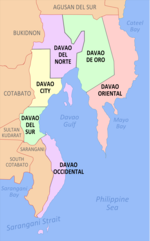Samal, Davao del Norte
Samal | |
|---|---|
| Island Garden City of Samal | |
 | |
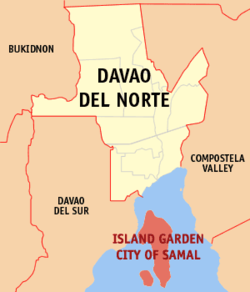 Map of Davao del Norte with Samal highlighted | |
Location within the Philippines | |
| Coordinates: 7°03′N 125°44′E / 7.05°N 125.73°E | |
| Country | |
| Region | Davao Region |
| Province | Davao del Norte |
| District | 2nd district |
| Founded | July 8, 1948 |
| Cityhood | January 30, 1998 |
| Barangays | 46 (see Barangays) |
| Government | |
| • Type | Sangguniang Panlungsod |
| • Mayor | Al David T. Uy |
| • Vice Mayor | Lemuel "Toto" Reyes |
| • Representative | Alan R. Dujali |
| • City Council | Members |
| • Electorate | 84,194 voters (2022) |
| Area | |
• Total | 301.30 km2 (116.33 sq mi) |
| Elevation | 32 m (105 ft) |
| Highest elevation (Mount Puting-Bato) | 535 m (1,755 ft) |
| Lowest elevation | 0 m (0 ft) |
| Population (2020 census)[3] | |
• Total | 116,771 |
| • Density | 390/km2 (1,000/sq mi) |
| • Households | 29,973 |
| Economy | |
| • Income class | 4th city income class |
| • Poverty incidence | 9.93 |
| • Revenue | ₱ 982.9 million (2020, 2019) |
| • Assets | ₱ 2,188 million (2020, 2019) |
| • Expenditure | ₱ 898 million (2020, 2019) |
| • Liabilities | ₱ 690.8 million (2020, 2019) |
| Service provider | |
| • Electricity | Davao del Norte Electric Cooperative (DANECO) |
| Time zone | UTC+8 (PST) |
| ZIP code | 8118 (Babak), 8119 (Peñaplata), 8120 (Kaputian)[5] |
| PSGC | |
| IDD : area code | +63 (0)84 |
| Native languages | Davawenyo Cebuano Ata Manobo Kalagan Tagalog |
| Website | samalcity |
Samal, officially the Island Garden City of Samal (IGaCOS; Cebuano: Pulong Harding Dakbayan sa Samal; Filipino: Pulong Harding Lungsod ng Samal) is a component city in the province of Davao del Norte, Philippines. According to the 2020 census, it has a population of 116,771 people.[3][6]
It is made up of Samal Island and the smaller Talikud Island in Davao Gulf, from the merger of former municipalities of Samal, Babak, and Kaputian.
Samal is a part of the Metropolitan Davao area and is two kilometers away from Davao City, in mainland Mindanao, the largest city and the primary economic center of that island.
Etymology
The name Samal was derived from the Sama-Bajau peoples, the natives who were the first inhabitants of the island. The first datu on the island was Datu Taganiyug, a native of what is now Peñaplata, today the governance center of the city. In the past, the people of the island named a place about what the said place is known for. For example, the name Peñaplata is said to be derived from the word "piña" or pineapple because of the abundance of pineapple in the area; this, however, is folk etymology, for peñaplata means "rock of silver" in Spanish. Tagpopongan is the first barangay on the island whose name was from the word "tagpo" or meet. It was so called because this place was chosen by the datus as their meeting place. The word Samal was also known before because it was commonly used as a surname by dat
History
Early beginnings
The island was initially home to the Muslim Sama-Bajau people, though it was also settled by the animistic Mansakas and Mandayas from northern and eastern parts of Davao Region the mainland. These settlers intermarried and were organized into communities, dynastically ruled by a datu until the early 20th century. Centuries later, Spain first reached Samal Island and managed to conquer the island in the late 1840s when Nueva Vergara (Davao City today) in the mainland was established.
World War 2
The Pacific War, which happened during World War II, struck the island. Japanese fighter planes bombed the island. Japanese forces occupied the island and forced the people to work for four years until they were expelled by the Allied forces. After the war, infrastructure was built, such as schools, churches, and stores in the area.
Official founding of the municipality
The time came on July 8, 1948, when the entire island itself became part of the newly created municipality of Samal;[7] it was the official founding of the municipality. Five years later in 1953, the municipality of Babak was created from Samal,[8] marking the political division of the island between the two municipalities. The island experienced further political division when the municipality of Kaputian was created from the island in 1966.[9] During this period, the standard of living in these three municipalities became low and extremely rural.
Proposed province
In 1969, a proposal to create the sub-province of Samal was created by Republic Act No. 5999[10] and covered the area of the present-day city. The act was enacted without President Ferdinand Marcos' approval. However, the sub-province was never inaugurated.
Cityhood
The city was created through Republic Act No. 8471 on January 30, 1998. This act paved the way for the dissolution and merger of the three former municipalities of Samal, Babak, and Kaputian into one local government unit by turning them into districts, now officially named IGaCoS, the Island Garden City of Samal. The first city mayor was Rogelio P. Antalan, who later served for three consecutive terms from 1998 to 2007.
On April 19, 2000, Air Philippines Flight 541 crashed in the city, killing all 131 people on board.[11]
Hostage crisis
On September 22, 2015, Kjartan Sekkingstad, aged 55, from Sotra, Norway, was abducted by Abu Sayyaf Islamist guerrillas from a high-end tourist resort on Samal Island, along with two Canadian men, John Ridsdel, aged 68, and Robert Hall, aged 67, and a Filipina woman, Marites Flor, Hall's girlfriend.[12] In April and June 2016, the Canadians were beheaded after ransoms were not paid, and in June 2016 Flor was released. On September 17, 2016, Sekkingstad was released on Jolo island, 600 miles south of Manila after captor Abu Sayyaf received $638,000 in ransom for his release. He was handed over to another rebel group, the Moro National Liberation Front. The MNLF was in peace talks with the government and had been working with authorities to secure Sekkingstad's release. It is not known who paid the ransom for Sekkingstad, but it was not the Norwegian government.[13]
Geography
Samal is the only city in the country that encompasses two entire islands, hence its name the Island Garden City. While pristine beaches dot the island's shores, hills dominate the middle portions of the island. Talikud Island is located southwest of the main island.
IGaCoS enjoys an evenly distributed rainfall throughout the year and a typhoon-free climate, which makes it ideal for agricultural production and tourism.
Climate
| Climate data for Samal, Davao del Norte | |||||||||||||
|---|---|---|---|---|---|---|---|---|---|---|---|---|---|
| Month | Jan | Feb | Mar | Apr | May | Jun | Jul | Aug | Sep | Oct | Nov | Dec | Year |
| Mean daily maximum °C (°F) | 29 (84) |
30 (86) |
30 (86) |
30 (86) |
31 (88) |
31 (88) |
30 (86) |
30 (86) |
30 (86) |
30 (86) |
30 (86) |
30 (86) |
30 (86) |
| Mean daily minimum °C (°F) | 22 (72) |
22 (72) |
22 (72) |
22 (72) |
23 (73) |
24 (75) |
24 (75) |
24 (75) |
24 (75) |
24 (75) |
23 (73) |
22 (72) |
23 (73) |
| Average precipitation mm (inches) | 98 (3.9) |
86 (3.4) |
91 (3.6) |
83 (3.3) |
133 (5.2) |
158 (6.2) |
111 (4.4) |
101 (4.0) |
94 (3.7) |
117 (4.6) |
131 (5.2) |
94 (3.7) |
1,297 (51.2) |
| Average rainy days | 16.4 | 14.3 | 16.3 | 18.5 | 25.3 | 25.0 | 23.8 | 21.9 | 20.8 | 24.4 | 24.3 | 18.7 | 249.7 |
| Source: Meteoblue (modeled/calculated data, not measured locally)[14] | |||||||||||||
Barangays
Samal is politically subdivided into 46 barangays. Each barangay consists of puroks while some have sitios.
In 1955, the sitios of Mambago, San Isidro, Santo Niño, San Antonio, San Agustin, Dangcaan, Balet, Tambo, Camudmud, and Cogon were converted into barrios of the now-defunct municipality of Babak.[15]
- Adecor
- Anonang
- Aumbay
- Aundanao
- Balet
- Bandera
- Caliclic (Dangca-an)
- Camudmud
- Catagman
- Cawag
- Cogon
- Cogon (Talikud)
- Dadatan
- Del Monte
- Guilon
- Kanaan
- Kinawitnon
- Libertad
- Libuak
- Licup
- Limao
- Linosutan
- Mambago-A
- Mambago-B
- Miranda (Poblacion)
- Moncado (Villarica)(Poblacion)
- Pangubatan
- Peñaplata (Poblacion)
- Poblacion (Kaputian)
- San Agustin
- San Antonio
- San Isidro (Babak)
- San Isidro (Kaputian)
- San Jose (San Lapuz)
- San Miguel (Magamomo)
- San Remigio
- Santa Cruz (Talicod II)
- Santo Niño
- Sion (Zion)
- Tagbaobo
- Tagbay
- Tagbitan-ag
- Tagdaliao
- Tagpopongan
- Tambo
- Toril
Demographics
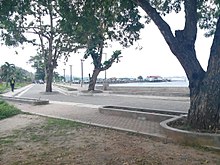
|
| ||||||||||||||||||||||||||||||||||||||||||||||||
| Source: Philippine Statistics Authority[16][17][18][19] | |||||||||||||||||||||||||||||||||||||||||||||||||
Cebuano is the common language spoken of the people of Samal Island, followed by Isama, and Tausug.
Economy
Poverty incidence of Samal
10 20 30 40 2006 35.70 2009 32.83 2012 28.54 2015 28.52 2018 12.29 2021 9.93 Source: Philippine Statistics Authority[20][21][22][23][24][25][26][27] |
Agriculture
The city's economy depends greatly on its agricultural production. Copra, mango, corn, vegetables, citrus, and fish are the major products of the island. Livestock production is also a major product with Davao City in the mainland Mindanao as the primary market. In addition, rice is also produced in the barangays of Libuak in Babak District and Aumbay in Peñaplata District.
Tourism
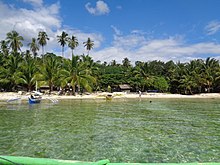
The city is the largest resort city in the country. It has good beaches and houses many beach resorts. It has also numerous marine reefs and tranquil waters that lure tourists to visit them, especially on Talikud Island. There are 34 registered resorts with a combined capacity of 1,000 rooms in the city.[28] Because of these, the Department of Tourism named it one of the best visiting islands in Mindanao and currently one of the fastest growing tourist destinations in the country. Thus, tourism is the main source of income in the city. Biggest taxes are imposed to tourism and resort industry.
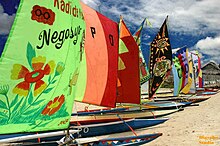
There are three main festivals held annually in the city, namely:
- Kabasan Festival, coincides with the founding of Babak municipality every year in May, features bikini open contests, fireworks display, street-dancing and street parties, and motocross events
- White Nights Festival, takes place every two days with Kaputian as the venue, celebrating the city's cultural and historical heritage; and
- Hugyaw Madayaw Festival, a spin-off of Davao's Kadayawan Festival which is also held annually in August, and also an attempt to preserve the diminishing Sama culture in the island.
Monfort Bat Sanctuary, the world's largest fruit bat colony,[29] is also located in the island.
Fishing
Fishing is also a growing business sector in this city, since the city was situated on the island, it cannot fully complement the demand for meat products imported from other parts of the country, especially in nearby Davao City and in other parts of the mainland Mindanao. The city has no both container port and deep-water transport terminal, except for a barge wharf at Babak district, to deliver market products directly to the city, so the city government advocated building fishery complexes across the city to minimize the demand for market products imported to the city. Fish, pearls, and edible crustaceans such as shrimps, prawns, and crabs are the main aquatic consumable products in the city.
Government
The center of city governance is located at Barangay Peñaplata, Samal District, situated at the west central coast of the island. The city has three districts: Babak, Samal and Kaputian. These districts used to serve as separate towns until the 1998 city merger.
Transportation
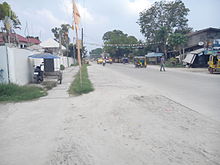
Barge/ferry service or passenger boats from the Sasa Wharf & Santa Ana Wharf in Davao City serves the island city. The modes of transportation on the island are motorcycles, tricycles or trikes, and bus and private car services offered by resorts.
Bus operators:
- Island City Express (operated by Mindanao Star) daily route to Kaputian, Babak, Peñaplata from mainland Mindanao via Davao City (via Kinawitnon ferry port).
Proposed Samal-Davao Bridge
Efforts to link Samal Island to mainland Mindanao via Davao City have been going on for decades. One of the earliest records of government attempts to get the project going is a news item from the Mindanao Times dated January 18, 1979, with the headline titled “Bridge to Link City and Samal”. It was not the first time that such project had been proposed. Several years earlier, talk of a bridge surfaced when an aluminum plant was being planned to be built on Samal Island by an eight-nation consortium of giant corporations.[6]
Decades later, talks of the proposed project resurfaced notably through informal surveys among both Davao City and Samal Island residents about the bridge with majority (138 out of 150 individuals) said they agreed the construction of the project.[30] Few years later, 3.98-kilometer bridge, a flagship project under the “Build, Build, Build” program during the administration of former President Rodrigo Duterte, will be hugely funded through a loan agreement with the Chinese government. The project groundbreaking ceremony soon led by Duterte's successor, President Bongbong Marcos who was joined by Duterte's daughter Vice President Sara Duterte and her brother, Rodrigo's son Davao City mayor Baste Duterte.[31] The project is scheduled to be completed in 2027.[32]
Sister cities
Local
 Las Piñas, Philippines
Las Piñas, Philippines
See also
References
- ^ Island Garden City of Samal | (DILG)
- ^ "2015 Census of Population, Report No. 3 – Population, Land Area, and Population Density" (PDF). Philippine Statistics Authority. Quezon City, Philippines. August 2016. ISSN 0117-1453. Archived (PDF) from the original on May 25, 2021. Retrieved July 16, 2021.
- ^ a b Census of Population (2020). "Region XI (Davao Region)". Total Population by Province, City, Municipality and Barangay. Philippine Statistics Authority. Retrieved July 8, 2021.
- ^ "PSA Releases the 2021 City and Municipal Level Poverty Estimates". Philippine Statistics Authority. April 2, 2024. Retrieved April 28, 2024.
- ^ "Zip Code Locator | PHLPost".
- ^ a b Saaduddin, Jii (May 26, 2023). "Island Garden City Of Samal: The #1 Popular Beach Vacation Destination In Davao Region". Retrieved June 6, 2023.
- ^ per Executive Order No. 151, s. 1948
- ^ per Executive Order No. 596, s. 1953
- ^ per Republic Act No. 4754 of June 18, 1966
- ^ "Republic Act No. 5999". Chan Robles Virtual Law Library.
- ^ Ranter, Harro. "ASN Aircraft accident Boeing 737-2H4 RP-C3010 Davao". aviation-safety.net. Archived from the original on March 31, 2019. Retrieved July 20, 2019.
- ^ Mogato, Manuel (September 21, 2015). "Gunmen abduct three foreign tourists from southern Philippines resort". reuters.com. Reuters. Retrieved October 12, 2017.
- ^ "Abu Sayyaf has released Sekkingstad". September 17, 2016.
- ^ "Samal: Average Temperatures and Rainfall". Meteoblue. Retrieved February 29, 2020.
- ^ "An Act Converting Certain Sitios in the Municipality of Babak, Province of Davao, into Barrios". LawPH.com. Retrieved April 11, 2011.
- ^ Census of Population (2015). "Region XI (Davao Region)". Total Population by Province, City, Municipality and Barangay. Philippine Statistics Authority. Retrieved June 20, 2016.
- ^ Census of Population and Housing (2010). "Region XI (Davao Region)" (PDF). Total Population by Province, City, Municipality and Barangay. National Statistics Office. Retrieved June 29, 2016.
- ^ Censuses of Population (1903–2007). "Region XI (Davao Region)". Table 1. Population Enumerated in Various Censuses by Province/Highly Urbanized City: 1903 to 2007. National Statistics Office.
- ^ "Province of Davao del Norte". Municipality Population Data. Local Water Utilities Administration Research Division. Retrieved December 17, 2016.
- ^ "Poverty incidence (PI):". Philippine Statistics Authority. Retrieved December 28, 2020.
- ^ "Estimation of Local Poverty in the Philippines" (PDF). Philippine Statistics Authority. November 29, 2005.
- ^ "2003 City and Municipal Level Poverty Estimates" (PDF). Philippine Statistics Authority. March 23, 2009.
- ^ "City and Municipal Level Poverty Estimates; 2006 and 2009" (PDF). Philippine Statistics Authority. August 3, 2012.
- ^ "2012 Municipal and City Level Poverty Estimates" (PDF). Philippine Statistics Authority. May 31, 2016.
- ^ "Municipal and City Level Small Area Poverty Estimates; 2009, 2012 and 2015". Philippine Statistics Authority. July 10, 2019.
- ^ "PSA Releases the 2018 Municipal and City Level Poverty Estimates". Philippine Statistics Authority. December 15, 2021. Retrieved January 22, 2022.
- ^ "PSA Releases the 2021 City and Municipal Level Poverty Estimates". Philippine Statistics Authority. April 2, 2024. Retrieved April 28, 2024.
- ^ "IGaCOS bullish on tourism campaign". Edgedavao.net. March 26, 2014. Retrieved April 7, 2015.
- ^ "Largest colony of Geoffrey's Rousette Fruit Bat (Rousetteus amplexicaudatus)". Guinness World Records. Retrieved December 7, 2012.
The Monfort Bat Colony, located in the Monfort Cave on the Samal Island in Mindanao, Philippines, is the largest colony of Geoffrey's Rousette Fruit Bat (Rousetteus amplexicaudatus)". As per an estimate from Bat Conservation International in 2006, the population in the Monfort cave was approximately 1.8 million.
- ^ Caña, Paul John (September 27, 2022). "Everyone Wants the P24 Billion Samal Island-Davao City Bridge, But It Will Destroy Marine Life in the Process. What Now?". Esquire Magazine Philippines.
- ^ Pinlac, Beatrice (October 27, 2022). "Bongbong Marcos leads Samal-Davao bridge groundbreaking in Davao City". INQUIRER.net. Retrieved February 16, 2024.
- ^ CEDadiantiTyClea (December 18, 2023). "No obstacles to Davao-Samal bridge construction — official". BusinessWorld Online. Retrieved February 16, 2024.
External links
- Samal Profile at the DTI Cities and Municipalities Competitive Index
- Philippine Standard Geographic Code
- Local Governance Performance Management System
- Official website
- Samal Island Guide
- ^ "Philstar.com | Latest Philippine news and multimedia". Philstar.com. Retrieved November 4, 2020.





